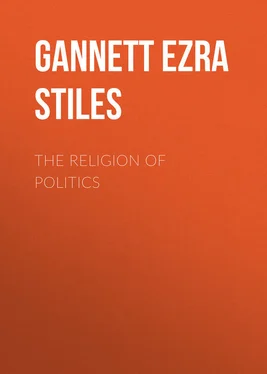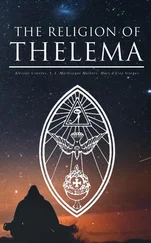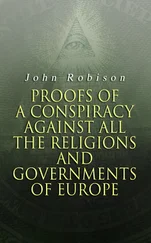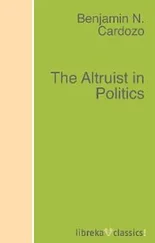Ezra Gannett - The Religion of Politics
Здесь есть возможность читать онлайн «Ezra Gannett - The Religion of Politics» — ознакомительный отрывок электронной книги совершенно бесплатно, а после прочтения отрывка купить полную версию. В некоторых случаях можно слушать аудио, скачать через торрент в формате fb2 и присутствует краткое содержание. Жанр: foreign_antique, foreign_prose, на английском языке. Описание произведения, (предисловие) а так же отзывы посетителей доступны на портале библиотеки ЛибКат.
- Название:The Religion of Politics
- Автор:
- Жанр:
- Год:неизвестен
- ISBN:нет данных
- Рейтинг книги:5 / 5. Голосов: 1
-
Избранное:Добавить в избранное
- Отзывы:
-
Ваша оценка:
- 100
- 1
- 2
- 3
- 4
- 5
The Religion of Politics: краткое содержание, описание и аннотация
Предлагаем к чтению аннотацию, описание, краткое содержание или предисловие (зависит от того, что написал сам автор книги «The Religion of Politics»). Если вы не нашли необходимую информацию о книге — напишите в комментариях, мы постараемся отыскать её.
The Religion of Politics — читать онлайн ознакомительный отрывок
Ниже представлен текст книги, разбитый по страницам. Система сохранения места последней прочитанной страницы, позволяет с удобством читать онлайн бесплатно книгу «The Religion of Politics», без необходимости каждый раз заново искать на чём Вы остановились. Поставьте закладку, и сможете в любой момент перейти на страницу, на которой закончили чтение.
Интервал:
Закладка:
Ezra S. Gannett
The Religion of Politics / A Sermon Delivered Before His Excellency John Davis, Governor, His Honor George Hull, Lieutenant Governor, The Honorable Council, And The Legislature Of Massachusetts, At The Annual Election, January 5, 1842
SERMON
The solemnities of this occasion belong to a Christian people. By them religion is solicited to throw her protection and authority around the institutions of the State. The citizen and the magistrate recognise their common relation to a higher Power than the functionary or the State, and in such recognition exchange the pledge of a mutual fidelity. The custom which this day renews comes to us from the founders of the Commonwealth – men of strong faith and religious hearts, who erected their political fabric as a temple in which to worship God, and inscribed over its front the name of the one Master whom they honored, even Christ. The place to which our legislators and rulers have come upon entering on their official duties is the house of prayer and Christian instruction. Every thing that distinguishes the occasion seems to point out the course of remark in which he who addresses this audience should invite his hearers to follow him. The relation of religion to politics – the religion of political life – is the subject to which he is unequivocally directed; and of which it is my purpose to treat, at such length only as the limits of the occasion will allow, but with such plainness of speech as should alone be used before freemen by one as free as they when speaking on their common duties.
There is however what may be called a political side to this subject, on which it would be improper for me to introduce any remarks at this time. The bare mention of religion and politics in connexion alarms some minds, who fear lest the liberties of the people be invaded by zealous religionists, or the public affairs of the time be handled by honest or ambitious preachers – in either case wandering beyond their appropriate limits. Let me at the outset disclaim all intention of touching questions to which a temporary interest only can belong, or of assailing the order of our civil state. It is higher ground which I hope to occupy as I examine the religious aspects of citizenship. When I speak of the religion of political life, I mean that religion should control men in the exercise of their political rights as it should control them in all their other relations and concerns. The religion of politics is nothing else than the application of religious principles to political action, whether it be the action of a statesman or a private citizen, of an individual or of the community. The politician should respect these principles as much as any other man. Political opinion, political discussion, political life should be brought under the influence of religious convictions. This is the ground which I take, and which I shall endeavor to prove is the only ground on which a Christian can consistently stand.
Religion should govern all political sentiment and action. Why not? Why should such a claim on behalf of religion be accounted extravagant, or meet with any other than a unanimous assent? Is not religion the supreme law; so acknowledged by the people of this land, at least by the thoughtful and sober part of the people? We but repeat one of the common-places of the pulpit, which however disregarded no one thinks of denying, when we say that the influence of religion should be paramount in every department of life. We but adopt an illustration with which every one is familiar, when we speak of it as a spiritual atmosphere, that must enclose the institutions and movements of society, and insinuate itself into every form of personal existence. The authority of religion, its right to exercise sway over human wills and human hearts, is admitted on all sides. It is not monks and nuns, nor religious teachers and their families, upon whom in these days it is believed that the command to fear God and work righteousness expends its force; it is not men on sick beds and in dying moments alone, of whom it is said, that they ought to think of the duty which devolves on them in view of their relations to God and eternity; but men and women full of life, in the midst of life’s cares, temptations and labours – the young, the vigorous, the busy – merchants in their traffic, farmers in the fields, scholars in their studies, mechanics in their workshops, the wife and mother in her domestic occupations, the daughter of toil at her needle – the rich, the poor – the wise, the simple – all should be religious, heartily, truly, constantly religious. This is the doctrine of the present time; or if it is not, it should be. This is the democratic doctrine about religion, and this is the Christian doctrine about religion. It includes all men under one law, and all sinners under one condemnation. Now why shall the politician be released from the demand made upon every one else? Why shall political life form an episode in the history traced by successive generations on the tablet of the ages, which shall have not only its own rules of composition, but its own principles of moral interpretation? Shall mercantile life be required to cover itself with the sanctity of moral obligation, shall the demand of the age be for a Christian literature, shall there be a general lamentation over the want of faith and virtue; and yet an exception be made in favor – no, not in favor, but to the disadvantage and disgrace – of one class of engagements, in which all the people of this country participate? Such injustice will not bear a moment’s examination. Away with it forever!
It seems impossible to misunderstand the language of Christianity on this subject. Undeniably it affirms its right to exercise universal dominion. It takes cognisance of all human action, extends its scrutiny to motives and feelings, and allows no condition, employment or exigency to raise a barrier against its entrance as the messenger of God to deliver and enforce his commands. It has one and the same instruction for all men, whether they live in palaces or wander houseless, whether they are versed in tongues or are rude of speech, men of science or men of handicraft, subjects of a monarchy or citizens of a republic; to them all it says, Hearken and obey – walk by faith – lead holy lives – fulfil all righteousness. Even if this be called by the unbeliever the pretension or the arrogance of Christianity, he must admit that the claim which it sets up is as broad as human existence. Wherever the religion of the New Testament can reach a man, over him it asserts its authority. No place so public, no spot so private, no situation so humble, no office so high, that Christianity will not rise to its eminence, descend to its depth, penetrate its seclusion, occupy its position, and still reiterate the same language, – speaking as one having authority, because it speaks in the name and in behalf of the Almighty. From the first has it advanced this claim of unlimited empire; its prerogatives change not with the mutations of society. It still shows a charter of “divine right” for the sovereignty at which it aims. It still claims, as it always has demanded, and ever will demand till it shall acquire, dominion over all classes, – from the slave of toil to the heir of a throne, from the pauper whom the charity of the State supports to the Ruler by whom the majesty of the State is represented.
It is important however that we have right conceptions of the nature of this dominion. Christianity, as we have noticed, aims at exerting a control over the motives, feelings and unseen life. It asks not for outward deference, but for inward submission. The conscience, the heart, the will must bow to its authority. A respect which lies on the surface only of the character, or which glides from the tongue like the schoolboy’s recitation of a few well-conned sentences, is not what the Christian owes to his religion, nor what it will accept in place of that homage of the soul which is the only proof of an insight into its nature. Strange that men should ever think to deceive God by playing the parrot or the hypocrite! There are many who make the fatal mistake of substituting profession for reality; and in a community who hold religion in high regard there may be politicians who will take this course in the hope of winning their fellow-men. If they succeed, they only effect a selfish purpose; they do not illustrate the influence of religion.
Читать дальшеИнтервал:
Закладка:
Похожие книги на «The Religion of Politics»
Представляем Вашему вниманию похожие книги на «The Religion of Politics» списком для выбора. Мы отобрали схожую по названию и смыслу литературу в надежде предоставить читателям больше вариантов отыскать новые, интересные, ещё непрочитанные произведения.
Обсуждение, отзывы о книге «The Religion of Politics» и просто собственные мнения читателей. Оставьте ваши комментарии, напишите, что Вы думаете о произведении, его смысле или главных героях. Укажите что конкретно понравилось, а что нет, и почему Вы так считаете.












